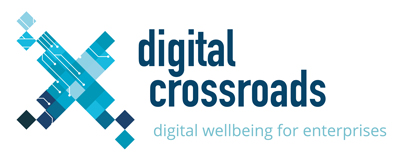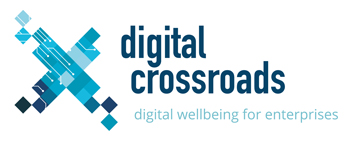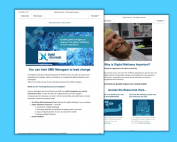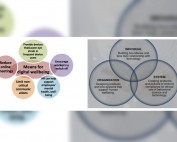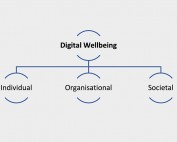More about Digital Crossroads
 THE DIGITAL PROBLEM
THE DIGITAL PROBLEM
Growing scientific evidence shows that unconstrained use of digital devices can have negative consequences for businesses in terms of productivity/performance and employees’ mental and physical health. Multitasking and the constant stream of notifications are associated with lower levels of creativity and concentration, and higher stress, while the google effect causes decreased memory efficiency. Collectively called “technostress” these issues are caused both by the technology AND by organisational expectations. The “always on” culture of checking emails at home or on holiday leads to worsened emotional states, poor work-life balance and burnout.
WORKPLACE WELLNESS
Many large corporations are already addressing digital overload, via wellbeing policies within their HR/CSR work. In a 2018 study of 500 senior HR executives from global organisations, 70% stated that policies to promote digital wellbeing were important. A similar study, though, found that 82% of SME employers do NOT have any digital health or wellbeing policies nor plans to introduce them. Moreover, our own research showed the issue is so new that no enterprise development or business training providers currently offers structured guidance on the topic: they too are unaware and unequipped.
OBJECTIVE
Therefore, the objective of DIGITAL CROSSROADS is to design, develop and implement a new approach to train European SME managers in employee digital wellbeing.
PROJECT ACTIVITIES
 The first tangible results of the project will be the intellectual outputs:
The first tangible results of the project will be the intellectual outputs:
- IO1: Digital Wellbeing Pathway Creator. An interactive online tool enabling SME managers to evaluate their strengths and weaknesses in relation to employee digital wellbeing and to determine a suitable pathway through the subsequent learning materials (IO2). A separate version will be designed for business advisors so they can apply the tool with a larger number of clients.
- IO2: Digital Crossroads Training Programme. A complete set of learning objectives, training materials and case studies providing SME Managers and business advisors to gain the knowledge, skills and self-belief required to implement an in-company programme to prevent employee digital overload.
